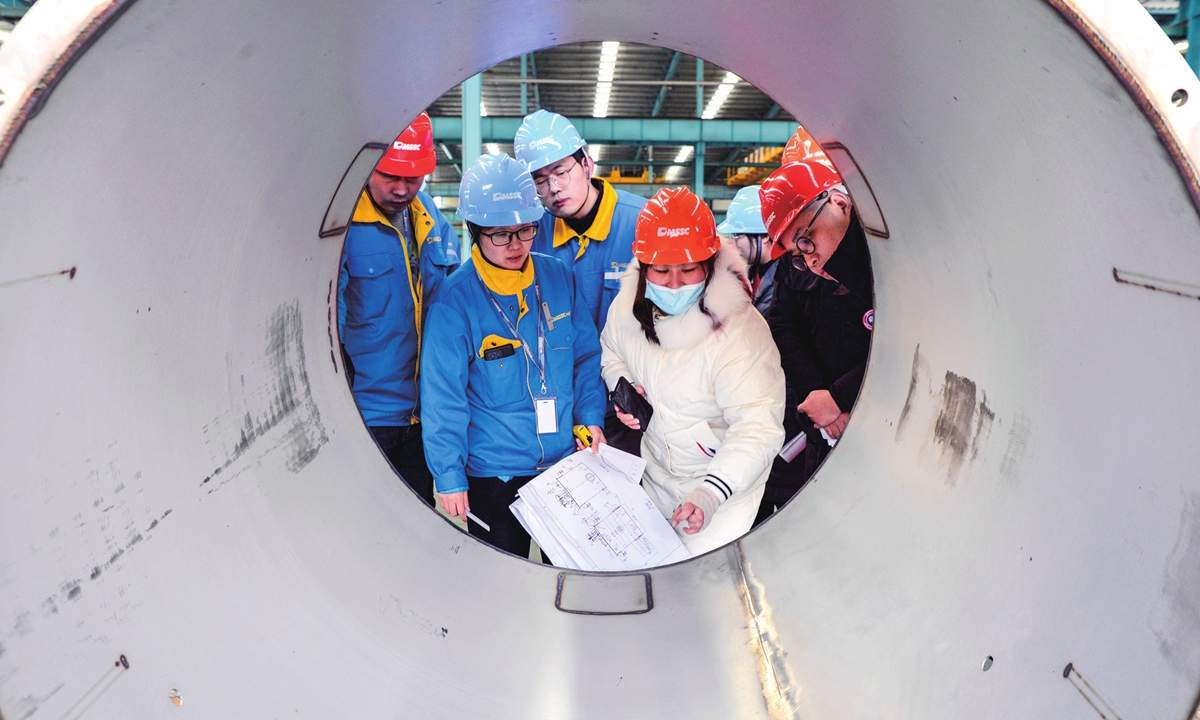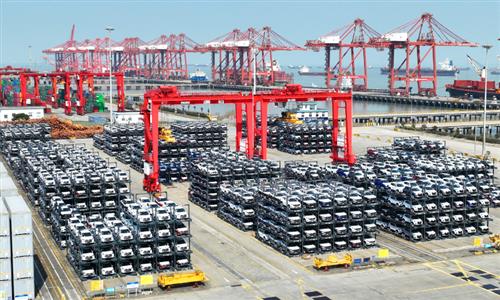
Workers check lithium battery manufacturing parts at a local factory in Wuxi city, East China's Jiangsu Province on January 14, 2022. Photo: VCG
Propelled by China's booming new-energy vehicles (NEV) production and rapidly rising NEV exports, the country's battery manufacturers and associated equipment makers are ramping up efforts to expand their "green foothold" in overseas markets.
China's comprehensive strength in manufacturing and its complete industrial line-up and the stable supply chain will continue to assist Chinese NEV companies' overseas investment, the Global Times has learned.
In the first three quarters of 2023, China's exports of solar panels, lithium-ion batteries and electric vehicles combined reached 798.99 billion yuan ($111.79 billon), a year-on-year increase of 41.7 percent and accounting for 4.5 percent of the nation's annual exports, data from the General Administration of Customs showed.
The rapid development of the new-energy sector and exports have become a major growth point for China's manufacturing sector, as Chinese new-energy brands are increasingly recognized at home and abroad, realizing a remarkable breakthrough of China's high-quality economic development, Cui Dongshu, secretary general of the China Passenger Car Association, said on Tuesday at the 10th Advanced Batteries for xEV/ESS Conference (ABEC) held in Shenzhen, South China's Guangdong Province.
Surpassing Japan
China surpassed Japan to become the world's largest vehicle exporter in the first half of 2023, with the NEVs exports going up significantly. From January to October this year, China's exports of the NEVs recorded a year-on-year jump of 99.1 percent to reach 995,000 units, data from China Association of Automobile Manufacturers showed.
Domestic industrial players from batteries to equipment manufacturers have shared the dividends of China's rapid progress in the new-energy sector, which will aid their expansion in overseas markets.
In August 2023, Sunwoda Electronic's first European factory opened in Hungary, the company told the Global Times during the 10th ABEC. Sunwoda is one of the world's leading battery makers based in Shenzhen.
The company's subsidiary Sunwoda EVB has invested approximately 1.9 billion yuan to build the first phase of an NEV power battery factory in Hungary, mainly engaging in the manufacturing and sales of lithium-ion batteries and related power battery systems.
Chinese-made power batteries, energy storage batteries and other industries have seen rapid development under the guidance of the national "dual carbon" goal, with a global advantage in a complete industrial chain of materials, batteries, equipment and recycling. These industries will help accelerate the overseas deployment through the export of products, industrial chain construction, technology output and other measures, Chinese battery manufacturer Farasis Energy said on Wednesday in a statement sent to the Global Times.
Amid a surging international demand, China-made lithium-ion batteries have become much-coveted export commodities armed with high technology, added value and competitiveness, thanks to the advantages in various aspects such as technology, service, and cost efficiency, said the company.
Farasis Energy currently has established research and development bases in the Silicon Valley in the US and Stuttgart in Germany, with major overseas deployment covering the US, Europe and Turkey.
China's machinery production for lithium-ion batteries has formed a relatively complete industrial chain with a stabilized mass production line thanks to an early start, David Luo, VP of sales and marketing from JM Intelligence Corporation - a Guangdong-based company specialized in battery machinery, told the Global Times on Tuesday on the sidelines of the 10th ABEC, adding that Chinese equipment enterprises are more experienced and technologically advanced than many foreign firms.
China now has the world's most complete industrial chain in the lithium sector which is also the largest in scale and most complicated globally, while China's innovation on lithium-ion batteries is also leading the world, Luo said at a subforum during the 10th ABEC.
JM Intelligence Corporation is currently expanding in Europe and the US market, with the European market starting to generate profits and the US market is still in the preparation stage, Luo said.
Challenges abroad
Amid the current complex global situation, industry insiders also outlined the challenges for Chinese NEV makers to expand abroad - which may also be viewed as opportunities.
Regarding the carbon footprint declarations implemented by new EU batteries regulation, Sunwoda said that it is both an opportunity and a challenge for Chinese battery companies.
On one hand, the regulation will enhance the sustainable competitiveness of China's power batteries, while domestic players can obtain more data shares through measures such as technological innovation to reduce carbon footprint. Meanwhile, the declarations are only the first part of the regulatory requirements, and more regulations are expected to be implemented which may cause more challenges in data security, the company said.
For the battery-making machinery, Luo said that localization is a challenge faced by many companies to develop various catering needs and applications for local customers. He stressed the importance for the industry to further collaborate with other players to realize continuous optimization.
Cui told the Global Times at the conference that Chinese automobile companies also need to establish their own overseas market bases, integrate closely with the local communities, and continue their technical innovations to seek more cooperation opportunities overseas.
For many years, China has been stepping up efforts to enhance green and low-carbon development which has achieved plausible results and greatly helped the world's fight against climate change.
In November, the National Development and Reform Commission, China's top economic planner, announced that 100 carbon-peaking pilot projects would be launched in 15 provinces to help solve bottlenecks constraining the country's green and low-carbon development, and explore new paths toward carbon-peaking, the Xinhua News Agency reported.
By 2025, a policy mechanism conducive to green and low-carbon development in the pilot areas will mostly be in place, together with many innovative practices and reforming measures that could be applied elsewhere.

